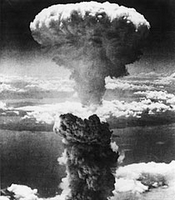
Some truths are just too big for contemporary minds to envelop.
Heliocentricity was one of these. When, in the 16th century, the great polymath Nicolau
s Copernicus postulated that the Earth rotated around the sun, and not the other way round, he wisely refrained from revealing his theory until he was on his deathbed, realizing the trouble his revolutionary idea was likely to create for him. A century later when Galileo Galilei, supported Copernicus's theory in his book
Dialogue Concerning the Two Chief World Systems, he did indeed get into trouble. He was convicted of heresy and spent the rest of his life under house arrest.
Evolution is another too big idea. When Charles Darwin published
On the Origin of Species by Means of Natural Selection in 1859, in which he revealed the mechanism of evolution, he stirred a whirlwind of protest. Leading scientists and, needless to say, clergymen, attacked his ideas vigorously. Even today, most Americans cannot deal with evolution, preferring a magical explanation of life on earth.
Now climate change joins this select group. The great majority of earth scientists agree it threatens the health of our planet and possibly the very existence of our species, yet a disturbing number of politicians, business leaders and journalists are reluctant to take the threat seriously, if they accept it at all. Al Gore has noted that while the scientific community considers global warming a virtual certainty, 55 per cent of the articles in the popular press consider it questionable.
Why are these ideas too big? Why do they overwhelm the human mind? Certainly not because of stupidity. Pope Urban VIII, the man principally responsible for Galileo's trial, was an educated man, a poet and patron of the arts. And many who attacked
On the Origin of Species were leading scientists as well as clergymen. And not all those who avert their minds from climate change are among the benighted.
The reason is quite likely because these ideas diminish us. They assault our ego.
If they are true, we are not at the centre of the univese, we are not separate from beasts, indeed we are a beast, and we are furthermore a beast fouling its own nest, destroying its own environment. We are too much reduced by these truths. We are an organism that has constructed elaborate ideologies, Judaism, Christianity, Islam, to name a few of the more important, and included detailed handbooks, the Torah, the Bible, the Koran, to verify our status as God's chosen species. For such an arrogant lot, these ideas are profoundly ego-shrinking, and many of us refuse the insult. The mythologies are much more comforting, so we will remain loyal to those, thank you very much.
In the past it didn't much matter. If a lot of people, even most people, didn't accept heliocentricity or evolution, so what? The sky wouldn't fall. Life would go on as always. Ignorance posed little threat. This is not the case with climate change. This is the greatest threat humanity has ever faced. If we don't deal with this issue, no other issues will matter. This is the big one. If it proves too big a reality for enough of us to accept, we will fulfill one myth at least: we will all burn in eternal hellfire as our planet turns into another Venus.
 Once again the hypocrisy in the war of words about nuclear weaponry is made manifest. British Chancellor of the Exchequer Gordon Brown, deputy and heir apparent to Tony Blair, says he wants Britain to renew and fortify its nuclear-weapons arsenal. The United Kingdom, along with other Western powers, is critical of Iran for its plans to enrich uranium, a preliminary to developing a bomb.
Once again the hypocrisy in the war of words about nuclear weaponry is made manifest. British Chancellor of the Exchequer Gordon Brown, deputy and heir apparent to Tony Blair, says he wants Britain to renew and fortify its nuclear-weapons arsenal. The United Kingdom, along with other Western powers, is critical of Iran for its plans to enrich uranium, a preliminary to developing a bomb.



























